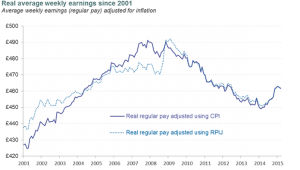Hands up if you deserve a payrise! Yep, of course you do. And look around, everyone else has their hands up too.
But payrises have been few and far between in recent times. In fact, adjusted for inflation, average earnings went down by 10% between 2008 and 2014.
So how can you make sure that your pay request will be successful when so many others were clearly not? Here we give you 5 top tips to make sure you get your well-deserved payrise.
1. Know your worth
Before you ask for any raise, its important to do your research about what your job is actually worth on the marketplace. Research comparable salaries: across your company, across jobs, across levels of experience, across industries, across geographies.
Of course, the data will be open to interpretation so know the real benchmark and choose your favourite.
2. Build a compelling case
You will need a compelling reason why you deserve the raise. They may be happy to pay you more but might still have to run it past their boss or HR or the finance team. So give them a strong case and help them persuade whoever they need to persuade. Even if they are the decision maker, they won’t want to lose face or look as though they’ve given in to you.
And your reason shouldn’t be to do with your new house/child/lifestyle/addiction, it should be a business case. Have you gone beyond your objectives? Have you consistently exceeded your targets? Show evidence, make it unarguable.
If you are getting really clever, you will not only cover the business case but you will also frame it in terms of something for them. For example, link the rise to work you are going to do that will help them achieve their targets or earn them a pay-rise. Not necessarily explicitly, if you get my meaning…
So much of the negotiation is done outside of the meeting-room so do whatever is necessary to help your cause. If qualifications are needed to get up to the next bracket, get them. If targets are needed to be met, meet them. If you need certain people to champion your case, get them on board. If you need people to start talking about you a bit more, raise your profile.
All to help the discussion inside the meeting room go more smoothly.
And whilst I’m not one that encourages doing sneaky tricks, if you think it’s necessary ask for a little more than you would actually be happy to settle with (whilst still being plausible). It will allow you to make a concession and still get a good rate. Remember, you want them to go away feeling they got a good deal too.
3. Know your alternative
To be taken seriously, you need to know what your Plan B is. Don’t bluff (“I’ll leave if I don’t get 20%”), your credibility will drop through the floor if you’re called on it. And even if they give in, it doesn’t exactly do wonders for your working relationship if they feel bullied.
That said, be clear about what you would do if you don’t get what you are asking for. And if they are not giving in, warn them of it and the consequences.
And know their alternative too. If you leave, they will have to go through the costs (time and money) of recruiting and training someone, as well as taking on the risk that the new person may never be able to deliver.
If it really comes to it, cost this out and make them aware of it.
4. Be friendly, firm and flexible
All of these discussions should be done in a friendly but firm manner. Whinging and threatening doesn’t make for a long-term solution. Always be positive about the job and them as a boss but always stick to your guns.
Don’t necessarily expect an immediate agreement. People don’t give away extra money easily, it is likely to take a few conversations before it happens. But you don’t have to agree straight away either, if their offer is below your asking figure. Take your time to consider it and the alternatives.
Be prepared for your boss’s counter-arguments and have your answers ready. Don’t fight, don’t get into an argument, but do have convincing reasons.
It may be that their hands are tied, they really can’t give you the money you want. Well, what else can they offer? A new title? More holiday time? A 4-day week? Working from home one day a week? Working on a new project? Training? Limo to work? Ok, that one’s usually hard to swing but do be flexible and creative.
And if they can’t give you it because they can’t seem to be favouring someone, it could be packaged as part of a new role, with new responsibilities, where that new role can be paid extra.
5. Trust but verify
And, as in all negotiations, trust but verify. No matter what they promise, don’t think about spending the money until it’s in your hands.
If they promise the rise, get them to say when it will be introduced, and get it in writing. The “We’ll give you a pay-rise in 6 months time” line is one of the Great Modern Lies (like “The cheque is in the post”, “Wine makes mummy clever” and “It’ll be alright, puss, just get in the travel-basket”).
Of course, it may be dependent on certain performance targets but make sure they are achievable and measurable before you agree to them, again, in writing. Otherwise they will have room to wriggle out of it.
Then stay on the case. Meet the targets and make sure you get that money.
There you go, 5 top tips of the very toppest type. It’s been a pleasure doing business with you and enjoy spending that money!
